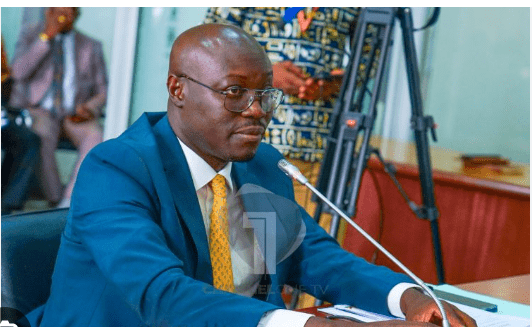Kojo Oppong Nkrumah notes that Dr Forson made this pledge at a time that the Mahama administration is expected to remove major tax handles, E-levy, Covid levy, and the Betting Tax.
He indicated that the Minority in Parliament would support Dr Forson for as long as he fulfils this promise without introducing or renaming existing taxes.
Contributing to a debate on the minister prior to their approval by Parliament on Wednesday January 22, the former Minister of Works and Housing said “Dr Ato Forson says his target is to move Tax to GDP ratio from 13 per cent to about 18 per cent, which is about 500 basis points. 1 per cent of GDP is about GHS 10billion. So, to move it from 13 to 18 per cent is about 50 billion Ghana Cedis, at a time when we have agreed across the political divide that some tax handles should be removed, e-levy, Covid levy, and betting tax.
“E-levy and Covid taxes alone are nothing less than GHS20 b
According to Dr. Forson, the country has substantial untapped potential in tax revenue mobilisation which can be harnessed without imposing additional taxes.
“We do not necessarily have to increase taxes to generate revenue, there is a need to improve compliance and address inefficiencies in the tax system,” he said.
He believes that the aspirational target of achieving a 20 per cent tax-to-GDP ratio by 2027 was overly ambitious, given current challenges.
illion. So what he is promising us is that he is going to take away about GHS 20 billion from the revenue handles but still grow it by another GHS 50 billion. We are hoping he would do that without introducing new taxes or renaming some of the taxes and whatever he would do in that area we would him and help.”
According to Dr. Forson, the country has substantial untapped potential in tax revenue mobilisation which can be harnessed without imposing additional taxes.
“We do not necessarily have to increase taxes to generate revenue, there is a need to improve compliance and address inefficiencies in the tax system,” he said.
He believes that the aspirational target of achieving a 20 per cent tax-to-GDP ratio by 2027 was overly ambitious, given current challenges.
Kojo Oppong Nkrumah notes that Dr Forson made this pledge at a time that the Mahama administration is expected to remove major tax handles, E-levy, Covid levy, and the Betting Tax.
He indicated that the Minority in Parliament would support Dr Forson for as long as he fulfils this promise without introducing or renaming existing taxes.
Contributing to a debate on the minister prior to their approval by Parliament on Wednesday January 22, the former Minister of Works and Housing said “Dr Ato Forson says his target is to move Tax to GDP ratio from 13 per cent to about 18 per cent, which is about 500 basis points. 1 per cent of GDP is about GHS 10billion. So to move it from 13 to 18 per cent is about 50 billion Ghana Cedis, at a time when we have agreed across the political divide that some tax handles should be removed, e-levy, Covid levy, and betting tax.
“E-levy and Covid taxes alone are nothing less than GHS20 billion. So what he is promising us is that he is going to take away about GHS 20 billion from the revenue handles but still grow it by another GHS 50 billion. We are hoping he would do that without introducing new taxes or renaming some of the taxes and whatever he would do in that area we would him and help.”
Dr Cassiel Ato Forson had stated that government is targetting a significant boost in tax revenue, aiming to increase its contribution to Gross Domestic Product (GDP) from the current 13.8 per cent to 18 percent in the medium-term.
This was disclosed during his vetting in parliament on Monday, January 13, 2025.
According to Dr. Forson, the country has substantial untapped potential in tax revenue mobilisation which can be harnessed without imposing additional taxes.
“We do not necessarily have to increase taxes to generate revenue, there is a need to improve compliance and address inefficiencies in the tax system,” he said.
He believes that the aspirational target of achieving a 20 per cent tax-to-GDP ratio by 2027 was overly ambitious, given current challenges.
A revised study titled ‘Survey of the Ghanaian Tax System’, conducted by the Ministry of Finance in collaboration with TaxDev researchers from the Institute for Fiscal Studies (UK) and published in 2024, revealed that although the prevailing tax-to-GDP ratio is nearly six percentage points higher than in 2000, it has shown limited improvement since 2017 and continues to fluctuate.
While the nation’s tax-to-GDP ratio aligns closely with the average for sub-Saharan African countries, it falls slightly below the global average for nations with similar income levels. Among 28 lower-middle-income countries with available data, Ghana ranked 16th in 2022.
The growth in domestic tax revenues since 2000 has largely been driven by increases in corporate income tax, personal income tax and value-added tax (VAT).
Together, these three tax categories accounted for nearly 70 percent of total tax collections in 2022 – up from 57 percent in 2000. However, revenue growth from personal income tax and VAT has stagnated in recent years.
Revenue from international trade has become a less significant contributor to the overall tax mix, though it remains important. In 2022 taxes on imported goods, including VAT on imports, made up 33 percent of total tax revenues compared to 54 percent in 2000. Specifically, the contribution of import duties to total tax revenue declined from 18 percent in 2000 to 13 percent in 2022.
The Finance Minister nominee also outlined plans to collabor ate with the Ghana Revenue Authority (GRA) and Tax Policy Unit of the Ministry of Finance to implement strategies aimed at boosting compliance.


